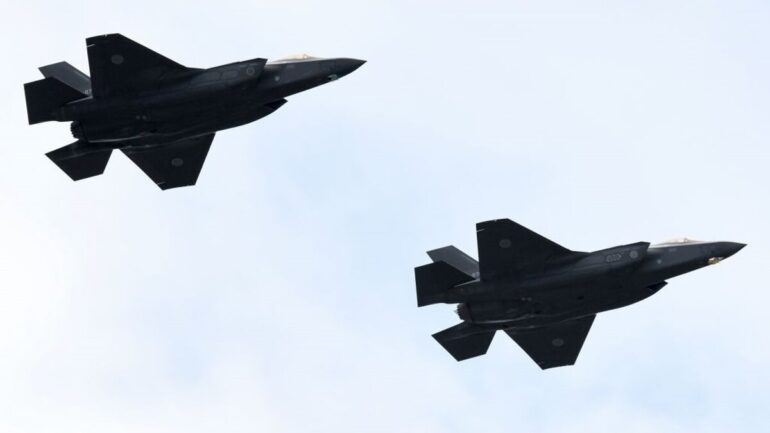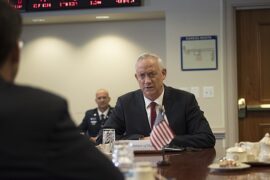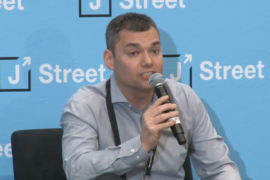Israeli Defense Minister Benny Gantz (Blue & White) and United States Secretary of Defense Mark Esper met at the Pentagon on Thursday to sign a joint declaration confirming Washington’s strategic commitment to maintaining Israel’s Qualitative Military Edge (QME) in the Semitic region.
What this likely means, given the fact that US President Donald Trump intends to sell Lockheed Martin’s F-35 stealth fighter jets to the United Arab Emirates, is that the State of Israel will be permitted to purchase even more advanced military technology from the US.
Administration officials have reportedly expressed a willingness to “expand the Israeli arsenal” once the UAE, and perhaps other states, receive the F-35s.
Hours before signing the “Abraham Accords” with the US, UAE and Bahrain on September 15, Prime Minister Binyamin Netanyahu (Likud) was reported by the Breaking Defense site to have asked Trump to support an $8 billion arms package for Israel that would include additional F-35s, 12 Boeing V-22s and the expedited delivery of two Boeing KC-46 refueling tankers (which would dramatically extend Israel’s range of attack).
Regardless of what Israel, the UAE, Bahrain or potentially Sudan stand to gain from Trump’s sensationalist outbreak of Middle East “peace” in recent months, it’s important that people on the ground in each of these nations not lose sight of the fact that our true collective interests demand less US involvement and less foreign arms sales into the region.
What Trump’s “peace” accomplishes, however, is increased US hegemony in the region and increased weapons sales.
But that might not be Washington’s only strategic benefit from the Abraham Accords. A number of policy experts closely associated with the Trump administration have suggested that the accords offer opportunities to curb Chinese investment in the State of Israel.
Following conversations with US National Security Advisor Robert O’Brien and UAE Ambassador to the US Yousef al-Otaiba, Professor Walter Russell Mead surmised in his Wall Street Journal column this week that “One suspects Washington would welcome having America’s Gulf allies displace China as an important source of foreign investment in Israel.”
As the State of Israel welcomed its first-ever official UAE delegation this week, both governments, along with the US, announced the launching of what’s being called the Abraham Fund.
The Jerusalem-based Abraham Fund aims to mobilize over $3 billion in investments and, according to an official statement, “to identify and initiate strategic projects with a high developmental impact, including those that catalyze economic growth, improve standards of living, and create high-value, quality jobs.”
Less than an hour after the fund was announced, Mark Dubowitz of the US-based Foundation for the Defense of Democracies tweeted that “Hopefully this will also help displace Chinese investment in Israeli critical infrastructure, assuming the criteria allow for investment in enhancing Israeli economic resiliency.”
Asked whether Dubowitz and Professor Mead, both influential within the administration, are correct in their assessments, and whether discouraging Jerusalem from relying on Chinese investments for Israel’s critical infrastructure was a consideration in establishing the Abraham Fund, a State Department source responded that “Reducing dependence on the Chinese Communist Party is a good thing.”
Foggy Bottom’s terse response would be true if Israel were to actually be dependent on China. But the statement rings cynical, given that the dependency Israel suffers from is actually on the US.
Washington has been pressuring Jerusalem in recent years not to allow Chinese involved in critical Israeli infrastructure projects, such as ports, desalination plants and the planned Tel Aviv light rail network.
The US has been increasing this pressure over the last year, and it’s expected to increase further regardless of who wins the upcoming US presidential election.
Israel is not currently part of the Washington’s “Clean Network” of nations that meet US standards of data privacy “from aggressive intrusions by malign actors, such as the Chinese Communist Party,” but sources inside Trump’s administration have expressed confidence that Israel will ultimately commit to excluding Chinese technology from its 5G mobile networks.
It appears that the Abraham Fund’s central function might be replacing Chinese investments in Israel with Emirati investments by helping Dubai-based companies win tenders that Chinese companies have until now received.
It appears that in addition to increasing the export of US arms to the Middle East, the Trump team has found a way to use the Abraham Accords to contain Beijing’s growing influence in the region.





